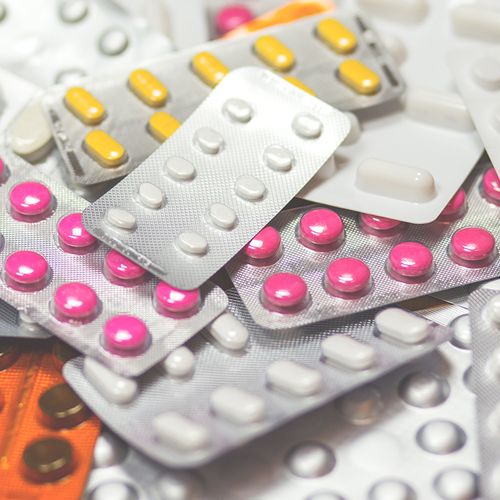Call them the quick-change artists of medicine-drugs or procedures designed to treat one problem but that can yield unexpected results for other conditions.
BOTOX®
It used to be that botulinum toxin was best known as a poison so deadly that a single gram could reportedly kill millions. Now, after being developed to treat a rare condition marked by spastic eyelid blinking and marketed as Botox®, it has become today's great wrinkle remover.
Also, studies indicate the muscle-freezing action of Botox®-the toxin that smoothes wrinkles by paralyzing muscles-exhibits promise in treating other conditions, including excessive sweating, cerebral palsy, post-stroke spasticity, back pain and even anal fissures Even those rushed and urgent bathroom breaks caused by benign prostatic hyperplasia (BPH)— enlarged prostate—seem to be better controlled with Botox®, according to a recent study at the University of Pittsburgh.
Aspirin
First, aspirin was touted for relieving headaches, back discomfort and other types of pain. Then, it gained popularity for its antiinflammatory effect on arthritis and other joint problems. Now, it is believed that a small nightly dose may help prevent heart attacks by stopping the formation of clots that block blood flow to the heart.
Statins
These cholesterol-lowering drugs including Lipitor, Crestor, Zocor and Mevacor are well-documented to reduce low-density lipoproteins (LDL), the so-called "bad" cholesterol by controlling an enzyme in the liver that is needed to produce cholesterol.
But now, statins are being tested to see if they have properties that would prevent liver disease itself, as well as colon and prostate cancer. Already, there's some preliminary evidence that these drugs may delay or prevent Alzheimer's disease and may reduce postoperative deaths.
Caffeine
Even if statins cannot prevent liver disorders, maybe caffeine can. A study by National Institutes of Health (NIH) researchers suggests that drinking coffee and other caffeinated beverages may perk up liver function in people at high risk of liver disease. Regular caffeine consumption also has been shown in several studies to reduce the risk of type 2 diabetes.
Alcohol
Many studies have found that a daily alcoholic drink, particularly when it's antioxidant-rich developed to treat a rare condition marked by spastic eyelid blinking and marketed as Botox®, it has become today's great wrinkle remover.
Also, studies indicate the muscle-freezing action of Botox®-the toxin that smoothes wrinkles by paralyzing muscles-exhibits promise in treating other conditions, including excessive sweating, cerebral palsy, post-stroke spasticity, back pain and even anal fissures Even those rushed and urgent bathroom breaks caused by benign prostatic hyperplasia (BPH)— enlarged prostate—seem to be better controlled with Botox®, according to a recent study at the University of Pittsburgh.
Aspirin
First, aspirin was touted for relieving headaches, back discomfort and other types of pain. Then, it gained popularity for its antiinflammatory effect on arthritis and other joint problems. Now, it is believed that a small nightly dose may help prevent heart attacks by stopping the formation of clots that block blood flow to the heart.
Statins
These cholesterol-lowering drugs including Lipitor, Crestor, Zocor and Mevacor are well-documented to reduce low-density lipoproteins (LDL), the so-called "bad" cholesterol by controlling an enzyme in the liver that is need ed to produce cholesterol.
But now, statins are being tested to see if they have properties that would prevent liver disease itself, as well as colon and prostate cancer. Already, there's some preliminary evidence that these drugs may delay or prevent Alzheimer's disease and may reduce postoperative deaths.
CAFFEINE Even if statins cannot prevent liver disorders, maybe caffeine can. A study by National Institutes of Health (NIH) researchers suggests that drinking coffee and other caffeinated beverages may perk up liver function in people at high risk of liver disease. Regular caffeine consumption also has been shown in several studies to reduce the risk of type 2 diabetes.
Alcohol
Many studies have found that a daily alcoholic drink, particularly when it's antioxidant-rich red wine, is beneficial to the heart. And, although red wine has the edge, all types of alcohol are believed to help the heart by raising high-density lipoproteins (HDL), the so-called "good" cholesterol.
In fact, there's early evidence that the cardiovascular benefit of such light drinking may outweigh the potential liver damage for patients who have chronic hepatitis C virus (HCV), who previously have been instructed not to drink at all. Caution: Talk to your doctor first.
Medical Tests
Similar to drugs, medical tests for one problem may reveal another. Perhaps an exam may reveal a telltale marker for a seemingly unrelated condition.
Testing for the Epstein-Barr virus (EBV), for example, may help determine the presence of-and ability to treat-nasopharyngeal cancer, a rare malignancy that was responsible for Babe Ruth's death.
A new blood test to measure kidney function has predictive value for people who have heart disease. A study has found that the new kidney test, which measures blood levels of a molecule called cystatin C, provides an accurate prediction of survival rates for patients who have had heart attacks. In that study of 726 heart attack patients, 55% of those who had the highest blood levels of cystatin C died shortly after their attack, compared with 7% of those who had the lowest levels.
Many vitamins, supplements and medicines come in multiple forms-pills, liquids, capsules, caplets, etc. Does the form matter?
In general, the form makes no significant difference. Use whatever you find easiest to take. The vitamin, supplement or over-the-counter medicine is exactly the same and will work the same way.
Best: Start with the form that is the least expensive. If, for some reason, you have trouble taking that, try another inexpensive form.
Also: Stick with generics—there is no need to buy brand-name pain relievers, for example, when store brands and other generics cost much less and work just as well.
